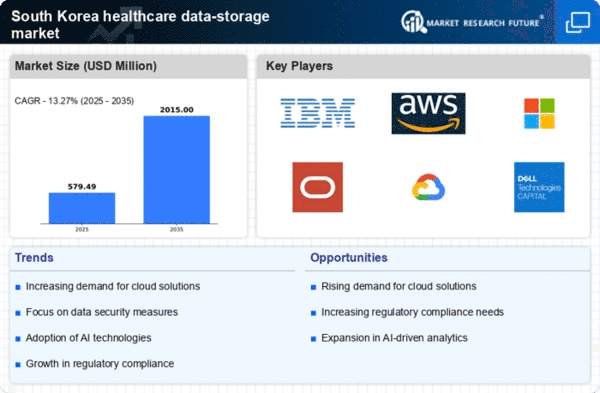Regulatory Compliance Requirements
The healthcare data-storage market in South Korea is increasingly influenced by stringent regulatory compliance requirements. The government mandates that healthcare organizations adhere to specific data protection laws, such as the Personal Information Protection Act (PIPA). This legislation necessitates robust data storage solutions that ensure patient confidentiality and data integrity. As a result, healthcare providers are compelled to invest in advanced data-storage technologies to meet these legal obligations. The market is projected to grow as organizations seek compliant solutions, with an estimated increase of 15% in spending on data-storage systems over the next five years. This trend underscores the importance of regulatory frameworks in shaping the healthcare data-storage market.
Growing Focus on Patient-Centric Care
The shift towards patient-centric care is influencing the healthcare data-storage market in South Korea. As healthcare providers prioritize personalized treatment plans, the need for comprehensive patient data storage becomes paramount. This trend is driving the demand for systems that can securely store and manage diverse health information, including genetic data and lifestyle factors. The healthcare data-storage market is expected to grow by 17% as organizations seek to implement solutions that support this patient-focused approach. By leveraging advanced data storage technologies, healthcare providers can enhance their ability to deliver tailored care, ultimately improving patient satisfaction and outcomes.
Rising Demand for Telehealth Services
The surge in telehealth services in South Korea is driving the healthcare data-storage market. As more patients opt for remote consultations, the volume of health data generated has increased significantly. This trend necessitates efficient data storage solutions capable of handling large datasets securely. The healthcare data-storage market is expected to expand by approximately 20% in the coming years, as providers seek to enhance their data management capabilities. Telehealth platforms require reliable storage systems to ensure seamless access to patient records and facilitate real-time data sharing among healthcare professionals. Consequently, the demand for scalable and secure data-storage solutions is likely to rise.
Technological Advancements in Data Management
Technological advancements are reshaping the healthcare data-storage market in South Korea. Innovations such as artificial intelligence (AI) and machine learning (ML) are being integrated into data management systems, enhancing data processing and analysis capabilities. These technologies enable healthcare organizations to optimize their data storage solutions, improving efficiency and reducing costs. The market is projected to witness a growth rate of 18% as organizations adopt these advanced technologies to streamline their operations. Furthermore, the integration of AI and ML into data-storage systems allows for predictive analytics, which can lead to better patient outcomes and more informed decision-making in healthcare.
Increased Investment in Health IT Infrastructure
The healthcare data-storage market is benefiting from increased investment in health IT infrastructure across South Korea. Government initiatives aimed at modernizing healthcare facilities are encouraging healthcare providers to upgrade their data storage systems. This investment is crucial for enhancing the overall efficiency of healthcare delivery and ensuring that patient data is stored securely. The market is anticipated to grow by 22% as healthcare organizations allocate more resources to improve their IT infrastructure. Enhanced data storage capabilities are essential for supporting electronic health records (EHR) systems and other digital health solutions, which are becoming increasingly prevalent in the healthcare sector.





















Leave a Comment